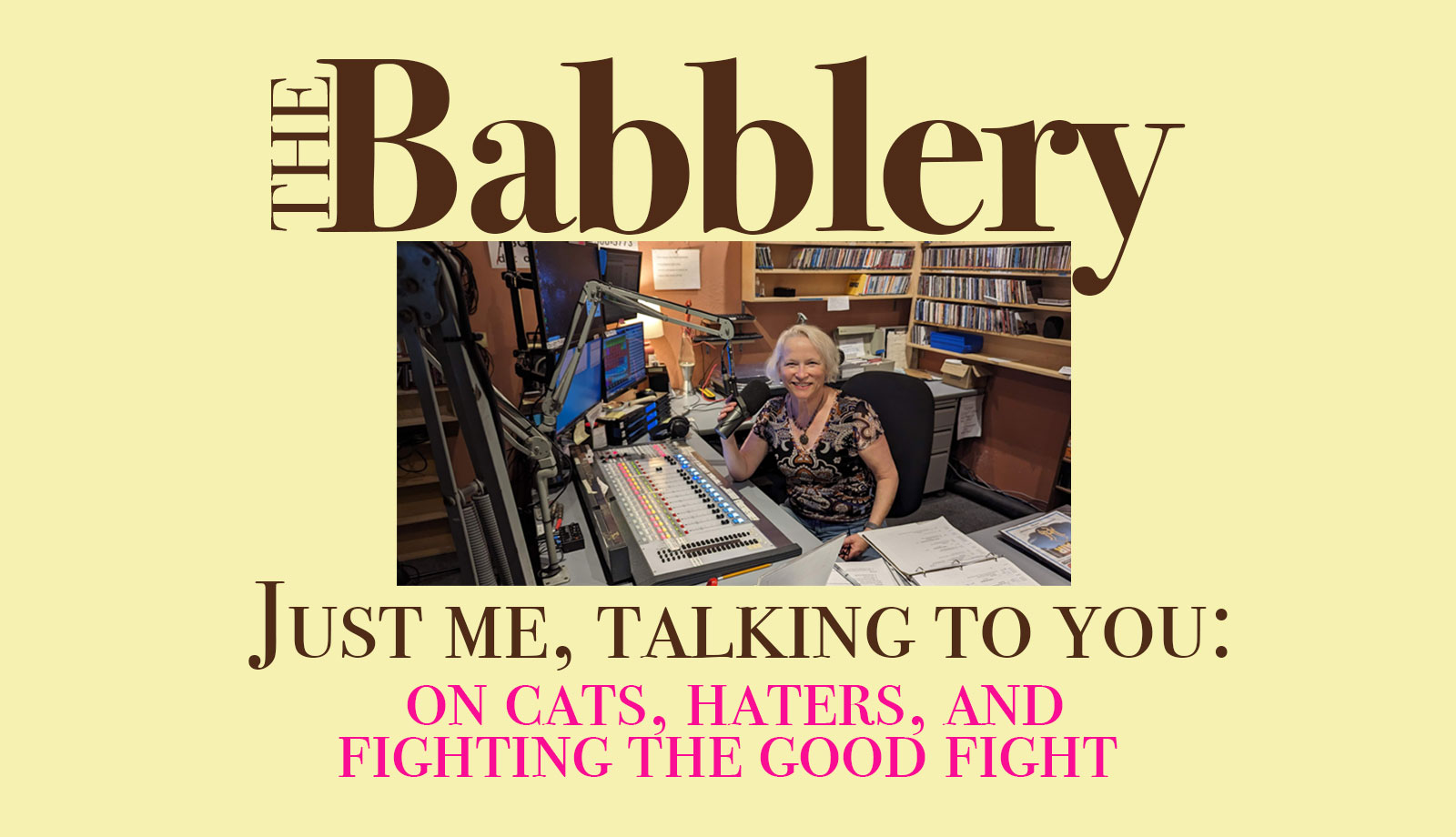
I’m your host, Suki Wessling, and this is a Minibabble, just me, talking to you during Women’s History Month.
My cat is featured in the forthcoming episode of The Babblery. The episode is not about cats in any way, it is an interview with feminist scholar Bettina Aptheker. But during our conversation, which took place in person in my office, my old cat kept interrupting us with his meows for attention.
I kept a little piece of him in that episode to memorialize him. Since that interview, my family has been in the process of helping him through his final days of dying from cancer. And in this time of caring for my beloved buddy, I had a run-in with a hater… of cats. Which made me think of my interview with Bettina, in a roundabout way.
In my experience, haters are not fully bad people. Their relatives might say apologetically, “Really, Uncle’s a sweet guy, but just don’t get him started…” Nor are haters all political haters. A hater is someone who needs the world to know about and accommodate their hatred. Whatever their hatred is, they look for ways to spread its poison. The ones I’ve known haven’t had any idea of what they’re doing, which is perhaps the most frustrating aspect of it.
We’re most familiar with these haters online, on social media, especially, because they can’t simply understand that their hatred is not relevant to the rest of us. That if they just kept their hatred to themselves, or shared it with other haters in isolated spaces, we’d happily ignore them. Of course, we would pity them because of the bile that is eating them from within. But it is their prerogative to hate. It’s a free country, after all.
The reason that I’m thinking about hatred in conjunction with this upcoming episode is that Bettina is anything but a hater, but I am guessing that some people in this country could not possibly understand that, because Bettina’s politics are seen as extreme. When she was young, she was a communist, daughter of a noted communist. Her family was surveilled by the FBI. She grew up knowing that she was hated for her views. Though she has long since left the communist party, I’m sure she understands why some people would brand her a radical. Wikipedia, in fact, calls her a radical feminist. But she’s not a hater.
“I don’t know if optimism is exactly the right word,” Bettina explains in our interview. “But I have a belief in the potential, the potential for a basic goodness of people and the basic humanity of people.”
Like many whose ideas might be seen as radical, Bettina sees beauty in humanity and wants us all to see it. But the haters want us not to see her or anyone like her. They want us be suspicious of each other. They want us to stay away from each other and not have in-depth conversation, because when we have in-depth conversation, we realize how much we share. Decent human beings, no matter what their politics, want to improve the lives around them. In the case of politics, they might have disagreements on which policies will be effective. But those disagreements will be honest and in good faith.
Our political life has become dominated by the voices of haters. They don’t want us to come together to solve problems, because they thrive on problems. They focus on the difficulty of accommodating the needs and desires of others, and insist on inserting their anger and hatred into any conversation. Like a person who can’t simply acknowledge the joy and love that a simple kitty has brought my family for 19 years, haters can’t see a person like Bettina for her humanity, and for the love that inspires her research and activism.
“Just ignore them” used to be a solid piece of advice. In the analog world, the more extreme haters in this country eventually became isolated, and when they banded together, others could easily show how outnumbered they were. We used to hold up examples like the throngs of decent humans who lined the streets of Skokie Illinois in 1977 to show Nazis that their views were not welcome. But in the digital world, one misogynist or racist troll can sound like 1000, and often the decent people stand by, remaining silent, unwilling to call out the abuse.
“We need to get away from the violence in our speech,” Bettina says. “We, as progressives, need to try to develop one that has a much more filled with a loving kindness, filled with compassion, filled with a vision of justice that’s not vengeful.”
Now, more than ever, it’s important for us to amplify the voices of people who speak from love, who listen, who argue in good faith about how to solve our problems. The Babblery is just my small attempt to do that, and I hope you enjoy the forthcoming episode with a brilliant woman whose life has been spent fighting the good fight, with love.

